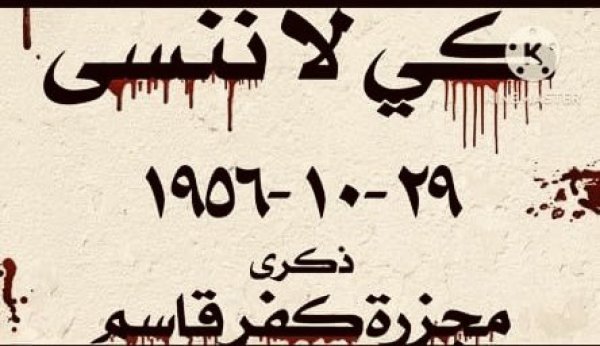
On October 29, 1956, on the eve of the Tripartite Aggression against Egypt, an Israeli Border Guard force executed a curfew in the area surrounding the village of Kafr Qasim in the Triangle region on the border with Jordan. The force, led by Major Shmuel Melinki, received orders to advance the curfew time in the area to 5:00 PM, an order that the villagers, especially those working outside the village, were unaware of. Melinki was explicitly instructed by Colonel Shadmi to kill those returning to the village without knowledge of the curfew time, stating, "It's better to have casualties. We don't want arrests. Let's forget about emotions. " The first victims were four workers who greeted the Israeli soldiers with the word "Shalom" (peace), to which three of them responded by opening fire, while the fourth Palestinian pretended to be dead and survived. Additionally, 12 women returning from olive picking were killed after Lieutenant Gabriel Dahan consulted the command via radio.
Over the course of an hour and a half, 49 people were killed, and 13 were injured, victims of the Kafr Qasim massacre. It is noteworthy that Israeli soldiers looted the victims' money and wristwatches.
Israeli authorities maintained silence regarding the massacre for a full two weeks until they were forced to issue a statement from the Prime Minister's office after news leaked to the press and media. To cover up the crime, a trial was conducted for thirteen accused, led by Colonel Shadmi. The trial resulted in Shadmi's acquittal, as he was supported by Moshe Dayan and Haim Herzog. However, Melinki was sentenced to 17 years in prison, and Dahan and Shalom Ofer were sentenced to 15 years each. Five others received sentences of up to seven years, while the rest were acquitted.
Interestingly, the trial of the Zionist defendants began after a full two years from the massacre, and by the year 1960, they were all outside of prison, enjoying freedom, as President Yitzhak Ben-Zvi granted them amnesty. It is noteworthy that Lieutenant Dahan hastily left for France, expressing his displeasure with the discrimination between Sephardic and Ashkenazi Jews in the judicial sentences against the perpetrators of the Kafr Qasim massacre.




Share your opinion